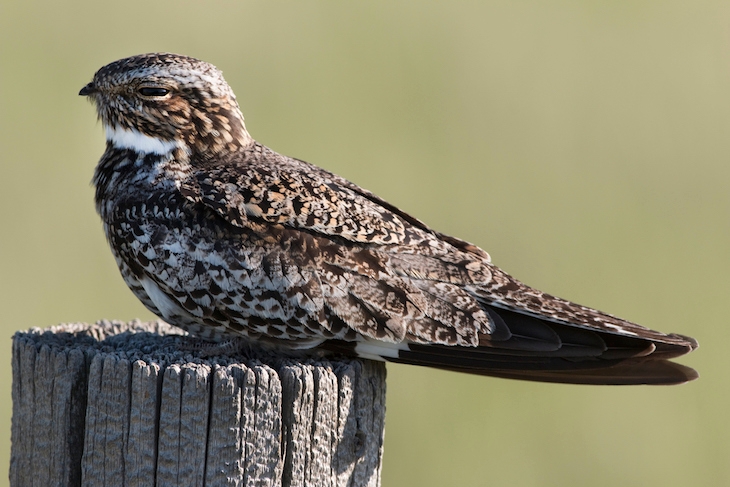While walking or riding on the beautiful heathland near my home, I have noticed a growing number of signs telling me to respect ground-nesting birds.
I keep the dogs close. I don’t let the horses trample through the undergrowth. But that is not proving good enough for the wildlife authorities who have begun to spend millions of pounds on a bizarre programme to divert human beings from large areas of heathland — not only where I walk but in dozens of other places across the south-east of England, so that these popular beauty spots can be left for the birds.
Natural England (the government agency for conservation) and local authorities in Surrey, Berkshire and Hampshire are campaigning to safeguard what they called SPAs, Special Protection Areas, by creating something they call SANGS, which is so loony that no one can agree whether it stands for Suitable Accessible Natural Green Space or Suitable Alternative Natural Green Space. Either way, welcome to the wacky world of rare-bird protection.
In this world, you, the human being living in an area known to conservationists as the Thames Basin SPAs, will be dissuaded from visiting your local heathland and instructed to go instead to a disused farm down the road, for example, where your local authority and wildlife chiefs have created for you an approximation of the favourite place you thought you were enjoying and appreciating but in fact were ruining. Allegedly.
The policy covers 8,274 hectares of Berkshire, Hampshire and Surrey, including Ockham and Wisley Common, where I walk and ride, and Whitmoor Common near Guildford, where I used to walk until I got fed up of being accosted by environmentalists brandishing leaflets telling me how many birds I was slaughtering just by being there.
There are three rare species in these heaths: woodlark, nightjar and Dartford warbler. They nest in small numbers on or near the ground and are susceptible to predation and disturbance.
On Ockham and Wisley, for example, recent surveys show up to seven Dartford warbler nests, four woodlark and five nightjar. On Whitmoor, there are two Dartford warbler nests, no woodlark and four nightjar. In total, there are around 1,000 of these protected bird nests in all three counties. Natural England believes that ‘recreational use’ of the heaths, having risen thanks to housing developments and population increase, is why the birds are struggling, although there is good evidence that their numbers are not struggling at all.
As a result, all housing development within five kilometres of each SPA is now subject to stringent tests and impact assessments. In effect, all house-building near some SPAs has pretty much stopped.
But don’t worry. You, recreational user, are going to be given a Suitable Alternative Natural Green Space to walk in. Whoopee!
Now, I have never seen a sign near where I walk telling me to go anywhere else, but Natural England insists: ‘Since 2008, 51 Suitable Alternative Natural Greenspaces [sic] have been created, relieving pressure on habitats and species.’ Natural England boasts that SANGS are only going to work if they are ‘more attractive than the SPA to users of the kind that currently visit the SPA’. It would appear hubristic to think it possible to create beauty spots more attractive than the purple-carpeted heathlands established over hundreds of years by generations of livestock grazing and scrub clearance.
In practice, over the next 125 years, Guildford Borough Council is spending £12.2 million on one SANGS alone, raised through a tally on developers. This is a piece of land called Tyting Farm. Their method reads like a handbook for crushing the soul: ‘It should be possible to complete a circular walk of 2.3-2.5km around the SANGS,’ the guidance from Natural England sets out. The SANGS will have ‘a gently undulating topography… and a view…with a monument or something to visit…’ It will ‘provide a variety of habitats for users to experience…’
‘Hills do not put people off visiting a site, particularly when these are associated with a good view, but steep hills are not appreciated. An undulating landscape is preferred…’
It is utter madness trying to quantify and then replicate a beauty spot. And what happens when a Dartford warbler pitches up at the alternative? Do they then have to create another alternative to protect the original alternative? Nevertheless, a housing levy on all new housing in the centre of Guildford for the next 125 years of some £6,500 per house has been put in place, to be paid for by developers.
In its draft plan, the council has estimated it will raise anything between £64 million and £90 million to develop SANGS to safeguard the small number of nests in its area. If you extrapolate that, 11 local authorities in three counties could be planning to spend well over a billion pounds. According to critics, that’s a punitive tax on development in an area where housing (for humans) is desperately needed and which is likely to increase house prices in the south-east.
And that’s before you consider the insanity that you, recreational user, are going to be told to drive three miles further to walk around a new beauty spot so that six or seven bird nests are not disturbed. Even if you have been drinking the environmentalist Kool-Aid and want to help these birds, there is scant evidence that your absence will help them. The latest stats show that the rare bird population is at virtually the same numbers as in 1998.
Wildlife Trust insiders tell me that bad weather was to blame for numbers declining in the past and that global warming had boosted them. What’s more, in a letter, the environment minister Thérèse Coffey recently advised that numbers have been ‘normalised’. So why the rush to spend a billion pounds diverting walkers, with near hysteria in official circles over visitor numbers?
Official surveys suggest that more than 83 per cent of visitors to SPAs arrive by car. A large proportion are dog walkers, many of whom visit on a more or less daily basis, it says. So we know who is trampling through the nests, then. Or do we?
As someone who has walked and ridden on Ockham for 15 years, I have noticed a big increase in visitors straying off the marked paths, but these people are not walking dogs. They are dogging.
Every day, dozens of cars pull up, driven by mostly men, but some women too, who disappear into the wooded areas of the heath to have sex with each other, leaving behind rubbish including condoms.
When I last wrote about this, I was told by council chiefs and police that this behaviour is not aggressively tackled because Ockham Common has been officially designated a ‘Public Sex Environment’ (PSE).
These people’s sexual preference is to do it outdoors and so, like the ground-nesting birds, their rights must be respected. But when the rights of ground-nesting birds come up against the rights of ground-nesting doggers, the left-leaning environmental lobby truly is in a fix, isn’t it?
Is the precious heathland nearest to London a habitat for rare birds, or is it a habitat for middle-managers stopping off for illicit open-air sex on the way home? It seems that it cannot be both.
I tried to get an official to respond to this, to no avail. A Surrey Wildlife source said: ‘You won’t get anyone to comment on that. No one wants to talk about it. But broadly speaking, the birds don’t nest in the wooded areas.’ Fine, but the point remains that the big rise in visitor numbers might not be from dog walkers but from doggers. And I don’t see anyone working out how to divert them. What, therefore, is the point of the SANGS initiative?
‘We have a duty to preserve our natural habitat so that future generations can enjoy the countryside,’ says a spokesman for Guildford Borough Council. No doubt. But defending our vulnerable heathlands from truly invasive human behaviours would require the authorities to confront a minority group more powerful than the Dartford warbler. And the idea that anyone would do that really is for the birds.







Comments